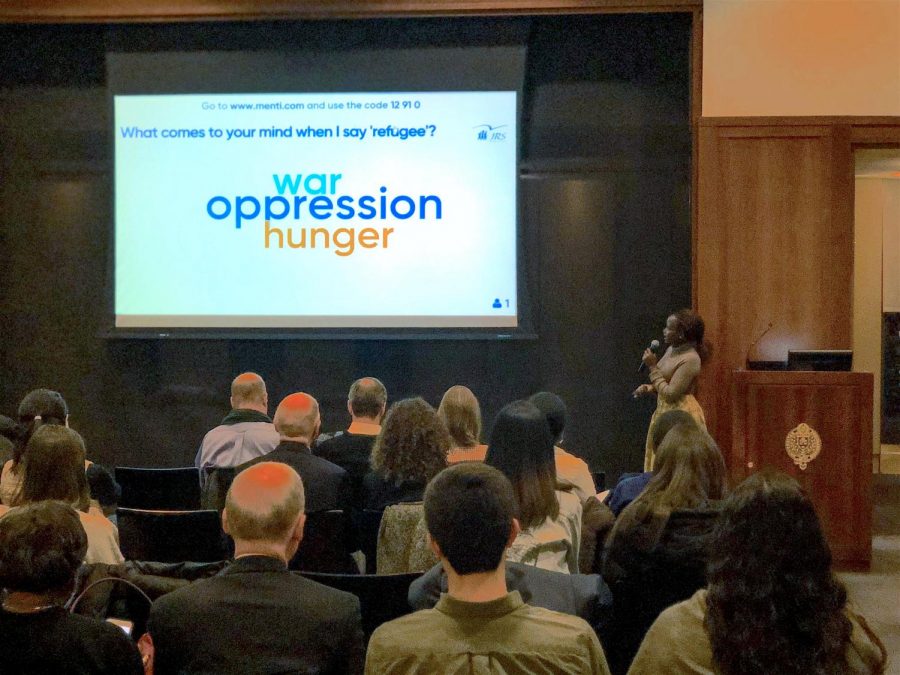Activist Tells Story at Lincoln Center About Being a Refugee
By Katie Schulte
On Thursday, Feb. 28, Fordham’s Institute of International Humanitarian Affairs (IIHA) and the Jesuit Relief Services (JRS) hosted activist Mireille Twayigira, M.D., at Lincoln Center for an event titled “Full of Hope: One Refugee’s Journey of Survival, Resilience, and Education.”
Brendan Cahill, Executive Director of IIHA, opened the event. He has worked with JRS for almost 20 years and said he wanted to shift the conversation about the refugee crisis from negative to optimistic.
“We live in a world where there are so many negative stories that confront us on a regular basis and yet here there is a remarkable beauty in the determination and character of Dr. Mireille Twayigira,” he said. “She overcame obstacle after obstacle and yet never lost her sense of thanks or service.”
Cahill began with an introduction of Twayigira and welcomed the representatives that accompanied her from JRS.
“Tonight, what we are doing is celebrating. We are celebrating Mireille’s emergence and her remarkable story,” said Cahill. “She is with us tonight to tell her story and it’s an exceptional one but it shouldn’t be so exceptional: education is a human right, education is here for all of us.”
Twayigira said that her journey is one of love, of God, of hope and of resilience.
“I just came here to share my personal journey as a young refugee and how education transformed that journey from tragic to hope,” she said.
The speaker event was interactive, in which Twayigira posed several questions to the audience. In response, the audience could submit words from their phones, which popped up on the screen for her to read and discuss.
For her first question, Twayigira asked what words came to mind when the audience hears the word refugee. Common words were oppression, hunger, war and resilience.
She said that of the 25.4 million refugees, more than half are children. According to Twayigira, the crisis has become more long-term, with children now being born as refugees and spending their formative years without basic needs such as education.
Then, Twayigira asked the audience, “What do you think needs of refugees are?”
“Education” was a popular submission. Twayigira went on to explain that 23 percent of refugees have access to secondary school and only one percent have access to university.
“I was lucky enough to be a part of that one percent,” she said.
Since becoming an advocate with JRS, she said she has travelled to several different countries including Spain, Italy and Chad. In Chad, she said she met teenage girls that had hopes of becoming doctors so they could support their families and communities.
For her next question, Twayigira asked, “What do you think will become of these individuals if nothing changes?” Among the answers were poverty, sex trafficking and illness.
“There’s so much potential in these individuals which can become lost but I’m here to share with you hope using my story to show that all these can be avoided if given a chance,” she said.
Then, Twayigira began to share her personal story as a refugee. Her journey began in Rwanda.
Since 1994, she travelled from the Congo, Angola, Zambia and then Malawi. She describes the struggles of displacement: no shoes, stealing food at times and dealing with the loss of her immediate family. She became an orphan at four years old, and her grandfather raised her until his passing in 2007.
In Zambia, her grandfather contacted a friend who had connections to education opportunities for young Twayigira. She helped the two financially and they were able to move to Malawi in 2000, where 10-year-old Twayigira enrolled in primary school run by JRS.
Even as a young girl, she knew that school was the only hope. She said young girls are disproportionally affected by displacement, and often denied access to rights such as education.
“Despite our past, education holds our only future,” she said.
Twayigira maintained her rank at the top of her class throughout school. She went on to an all-girls boarding school for her secondary education. She was one of six girls and the only refugee of five Malawians, who scored the highest on the final examination.
“Now there was a chance for me.” She was awarded a scholarship to a medical university in China, however, she did not have a passport, as a result of her refugee status. Despite challenges, she was awarded Malawian citizenship and went to medical school in 2010. Medical school came with its own challenges, one being that she had to learn a new language for her studies.
She concludes her personal story by saying she realized her purpose while at university. She said her story is something she wishes to share with others, to urge young refugees that hope is still alive as long as they are.
“I had begun to see hope in my own story, because up until that time I had only seen tragedy,” she said.
In speaking at Fordham, Twayigira said she hopes people will see that JRS’ Global Education Initiative is worth their time and resources. Education allows people to be self-reliant and not dependent entirely on aid. Only two percent of all humanitarian aid goes to education, and her goal is to change that number for the coming generations.
Twayigira ended her lecture with statement of unity and a call to action.
“We share one humanity, we are all one human race,” she said. “We share suffering, we share joy, we share everything […] one question remains. Are you with me?”







































































































































































































